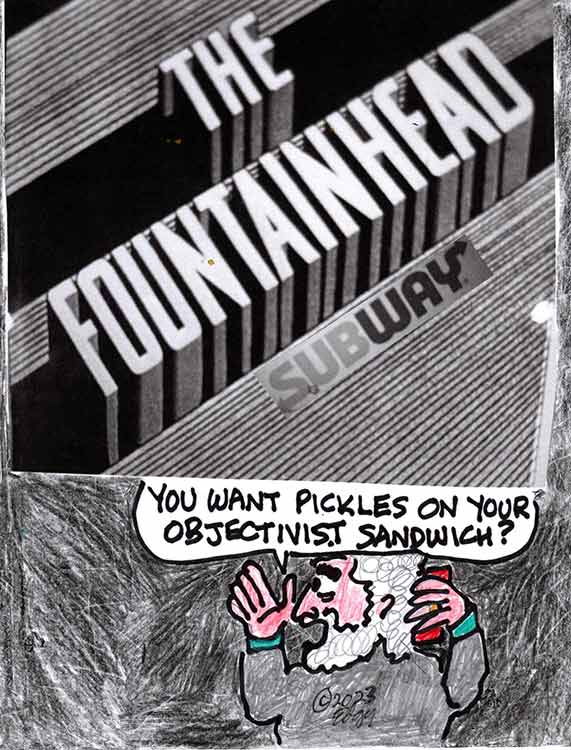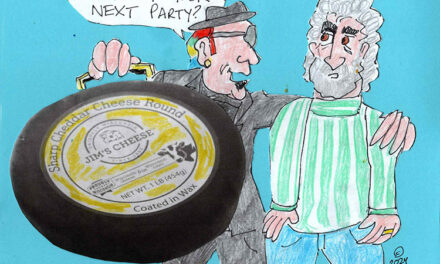Roark to Buy Subways?
Ayn Rand Hero Buys Purveyors of Heroes
By Ed Goldman
Ayn Rand must be doing aerobics in her grave. “Subway Agrees to Buyout By Roark,” the New York Times reported in its Business & Finance section one recent Friday.
If you’re unfamiliar with the novel and film of “The Fountainhead,” feel free to skip today’s column. Perhaps I should have, too. But I’m crazy about Rand’s seven virtues: rationality, independence, integrity, honesty, justice, productiveness, and pride.
Ayn Rand shrugged
Put them all together and they somehow spell her biggest concept, Objectivism. Clearly, Ayn Rand couldn’t spell.
If you’re a fan of “The Fountainhead,” you know it’s about Howard Roark, the unyielding architect whose egotism and aesthetics put him right up there with real-life’s Frank Lloyd Wright or your most obnoxious uncle (without the aesthetics). You’ll be thrilled to know Howard’s back in action and buying up sandwich shops.
I imagine he’s demanding that the sandwiches be prepped his way and no one else’s because, after all, “Every sandwich is like a person. Single and unrepeatable.” This is a slightly modified quote from the novel: I substituted the word “sandwich” for “building.” Try doing this yourself as a drinking game.
As for the deli itself, it may represent to Roark “a pedestal from which a god had been torn, and in his place there stood, not Satan with a sword, but a corner lout sipping a bottle of Coca-Cola.” This is an actual, unmodified quote from the novel. Vote online for which quote you prefer once we set it up at our website. Don’t wait on us, though, if you have other commitments for the rest of your life.
I confess that when I first read that headline I thought it meant that Howard Roark was buying the New York City underground metro. I’m glad I was wrong. In “The Fountainhead,” Roark deals with rats but these rats mainly wear suits and, many of them being architects, bowties and red-framed eyeglasses.
If you recall the novel and movie, which starred Gary Cooper, Patricia Neal and Raymond Massey, Roark lets an architect use his design for a new working-class community provided the architect doesn’t alter a single inch of Roark’s work. Naturally, the guy does, and Roark, being an Objectivist with a convenient knowledge of major explosives, blows up the community prior to its ribbon-cutting, disappointing New York City Councilmembers who’d hoped to see and possibly touch the ginormous scissors used for photo ops of this sort.
He’s brought to trial, of course, where he makes a speech that’s rather incoherent by today’s standards as well as those in existence when the book and movie were released, arguing that blowing up a still-uninhabited community was not only his right but a moral imperative, rationality-wise, independence-wise, integrity-wise, honesty-wise, justice-wise, productiveness-wise and wise-guy-wise.
I imagine the owners of Subway had something written into the bill of sale that once its chain of sandwich shops was under Roark’s aegis, he’d promise not to blow them up. I believe this would come under the heading of Best Practices—though Ayn Rand doing aerobics in her grave also might.
Don’t forget! A new Goldman State Podcast drops every Friday!
Ed Goldman's column appears almost every Monday, Wednesday and Friday. A former daily columnist for the Sacramento Business Journal, as well as monthly columnist for Sacramento Magazine and Comstock’s Business Magazine, he’s the author of five books, two plays and one musical (so far).













